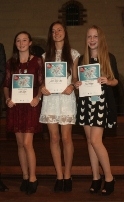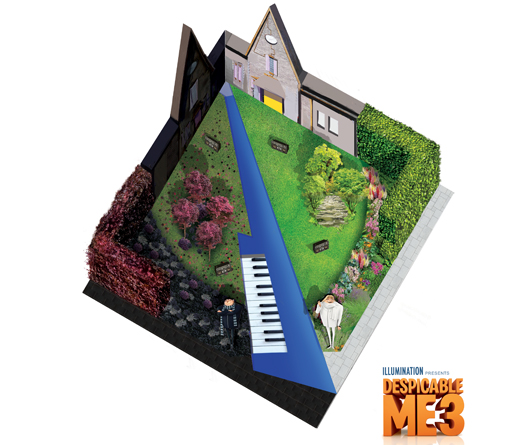
First prize at the 25th EU Contest for Young Scientists, worth €7000, went to Emer Hickey, Ciara Judge, and Sophie Healy-Thow from Kinsale Community School, Cork, for their project entitled “A statistical investigation of the effects of diazotroph bacteria on plant germination”.
Máire Geoghegan-Quinn, European Commissioner for Research, Innovation and Science said: “The future is bright if this is the level of talent we are producing in Europe. It is particularly great to see the mix of curiosity-driven research and more applied projects. We need more young people to take up STEM subjects at school, and I especially want to encourage more young women to pursue careers in science and technology.”

Emer Frances Hickey, Ciara Elizabeth Judge and Sophie Healy-Thow
Their winning project looked at Diazotroph bacteria – well known to have a symbiotic relationship with the legume plant family whereby the bacteria thrive while providing energy to the plant itself via the nitrogen fixation process. The project outlined an extensive experimental program to assess the impact of such bacteria on non legume crop species. The results show that two types of the rhizobium family of Diazotroph bacteria produce a statistically significant acceleration (increase of 17% for Rhizobium leguminosarum and 28% for Rhizobium japonicum; p<001) in the rate of barley crop germination.
In addition to winning first prize, the girls from Kinsale Community School, aged between 15 and 16, received an Honorary Award (linked to the 1st prizes), which will see them travel to the London International Youth Science Forum 2013.
Ireland has an impressive track record when it comes to winning the EU Contest for Young Scientists (EUCYS) scooping the top prize 15 times over the last 25 years. Last year the winners were Mark Kelly and Eric Doyle from Synge Street CBS, Dublin and in 2011 the winner was Alexander Almini from Castleknock College, Dublin.
More
The best young scientific minds in Europe were in Prague today for the 25th annual EU Contest for Young Scientists (EUCYS). 126 promising young scientists aged 14 to 21 presented their projects in the hope of impressing an international jury. The winners shared a total of €54.500 in prize money, as well as other prizes such as science trips.
The contest brought 85 projects from 37 countries to Prague, including EU Member States and other associated and international countries. As well as the awards ceremony, the young scientists were able to display their projects at a four-day exhibition and take part in a number of workshops and side conferences.
In all there are 3 first prizes of €7000 each, the other two being awarded to Perttu Pölönen from Finland for “Music A’ Clock” and Frederick Turner from the United Kingdom for “Genetics at home: Building a PCR machine and other equipment for setting up a home genetics lab”. The three second prizes were given Austria, Germany, Switzerland, and three third prizes to projects from Hungary, Germany and Belarus.
This year’s jury was chaired by Dr Henrik Aronsson, from the University of Gothenburg. All entries had already won first prize in their country’s respective national science contests in their specific field. The project topics covered a broad spectrum of scientific areas: biology, physics, chemistry, computing, social sciences, environment, mathematics, materials, engineering and medicine.
Background
The European Union Contest for Young Scientists was set up by the European Commission in 1989 to encourage co-operation and exchange between young scientists and to give them an opportunity to be guided by some of Europe’s most prominent researchers. The first competition took place in Brussels and has been held in 23 different European cities since then.
The contest seeks to support efforts made in participating countries to attract young people to studying STEM (Science, Technology, Engineering and Maths) and to choosing careers in science and research. Since 1989, the number of young scientists participating has increased every year, from 59 at the first edition to 126 in 2013, with a peak in 2009 in Paris of 137 contestants.
Female participation in the contest reflects the broader issue of underrepresentation of women in STEM. This year, just under 35% of the participants were female (44 participants vs. 82 male participants). In 1997 female participation in EUCYS exceeded 30% for the first time, and since then has usually been between 30% and 35%, with a peak of 41% in 2005. Over the 25 years, 168 girls and 576 boys have won prizes.
Full details of this year’s contest can be found at:http://media.eucys2013.cz. All three first prize winning teams were awarded €7000; second and third-placed teams received €5000 and €3500 respectively. Other prizes included trips to the London International Youth Science Forum and the Stockholm International Youth Science Seminar, prizes from corporate sponsors including trips to Intel ISEF in the US, as well as awards from the European Commission’s in-house science service, the Joint Research Centre, pan-European research organisation group Eiroforum and the European Patent Office.
Source: European Commission – Cork Students Win First Prize at EU Young Scientists Award





